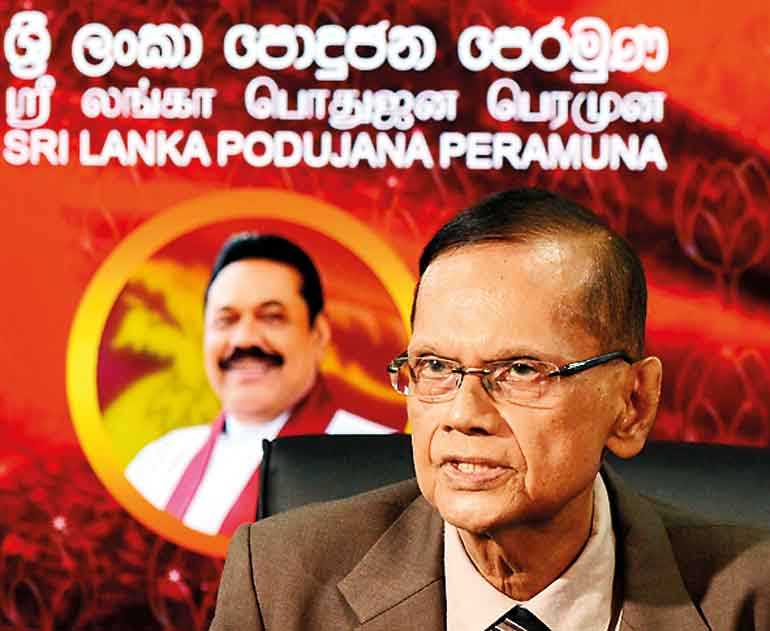Thursday Feb 19, 2026
Thursday Feb 19, 2026
Saturday, 8 August 2020 01:39 - - {{hitsCtrl.values.hits}}

SLPP Chairman Prof. G. L. Peiris at the press conference yesterday – Pic by Upul Abayasekara
By Asiri Fernando and Nuwan Senarathna
Fresh from their impressive two-thirds victory at the Parliamentary Elections this week, the Sri Lanka Podujana Peramuna (SLPP) yesterday pledged to form a ‘respectful’ Government that will take on board public views, and conceded they now have no excuses to not achieve their political, development and reform goals.
Visibly pleased, SLPP Chairman Prof. G. L. Peiris described the landslide victory at the General Election as a “pivotal moment in the political history of the country”, and thanked those who voted for the party and helped in numerous ways to conduct a successful campaign amidst COVID-19.
Prof. Peiris pointed out that the SLPP had won over 6.8 million votes and that the other parties combined failed to even net half that number. The former Foreign Minister also took the opportunity to thank the SLPP National Organiser Basil Rajapaksa, who spearheaded the campaign to gain a historic two-thirds majority at the polls. Many jubilant SLFP supporters were also milling about the party headquarters last morning with the freshly-tarred lane leading to it still littered with the splintered fragments of firecrackers.
“The public have given the Government the capability to amend and update the Constitution.” However, Prof. Peiris cautioned that having obtained the coveted two-thirds majority that did not give the Government a blank cheque to act in a “short-sighted and selfish manner”.
The two-thirds majority also comes attached with significant responsibilities, Prof. Peiris noted.
“While we are satisfied with the mandate the public has provided, we are cognisant of the challenge it poses. We can no longer make excuses and have to reach our goals as the voters have provided our party and Government with the power and capability to do so.”
“We are going to form a respectful Government, and we will listen to opposing views and discuss concerns. The Government that is to be established on 20 August will be sensitive to the people’s views and needs,” he added.
Peiris stressed that the Government bows to public and humbly accepts the mandate provided and vowed to reach the goals set before the public in the timeframe provided.
Prime Minister-elect Mahinda Rajapaksa will be sworn into his second term as Premier on Sunday at Kelaniya Raja Maha Temple.
“The public has responded to the President’s call and has endorsed his manifesto and willingness to work. The President called on the public to give him the support he needs from Parliament to achieve his goals, and they have given a resounding response.”
He stressed that the President’s ability to get the job done had compelled voters to give the SLPP a landslide victory. “We expected to get a majority Government but even we didn’t expect this much support,” he conceded.
Commenting on the monumental loss suffered by the United National Party (UNP), Prof. Peiris said that the public had rejected the style of politics championed by the party and its leadership. “The UNP has been routed, they have suffered setbacks before. Once in 1956, they only secured eight electoral seats, but they have never lost all the seats they ran for until now. This is a washout.”
Prof. Peiris opined voters had placed their faith in the Government due to three key reasons. Namely the Government’s efficient handling of the COVID-19 outbreak, the President’s resolute leadership, and crackdowns on organised crime and narcotics trafficking. “This points to the leadership skills of President Gotabaya Rajapaksa and the public have come to like them. He is efficient, focused and practical in his approach to getting things done.”
Having a weak Opposition will force the incumbent Government to review their own performance, he claimed, pushing it to essentially police its own decisions and policies. “This will force the Government to self-critique. I believe we will need to empower the oversight committees in Parliament. We believe that the Opposition members in these committees will ensure stronger accountability.”
He singled out the Committee on Public Enterprises (COPE) as an example of one of the committees the Government hoped to strengthen.
Prof. Peiris said that with two-thirds power secured in Parliament, the Government can proceed to change the Constitution if the need arises. “There are many shortcomings in the 19th Amendment that need to be reviewed. Through practical lessons learned in the past, it is clear that the 19th Amendment needs some changes.”
He reiterated that the Government will revisit foreign agreements it is not on the same page with and would continue its stance regarding the Human Rights Council (HRC). However, Prof. Peiris made no explicit reference to the Millennium Challenge Corporation (MCC) agreements that garnered much attention during the last few months.
One of the first tasks of the new Government will be to present a fresh Vote on Account, which will be the fourth since late last year, to Parliament before readying a fully-fledged Budget for 2021.
One of the priorities will be to tackle the serious impact of COVID-19, which has hit the economy hard, resulting in growth contracting in the first quarter, Prof. Peiris assured. He was optimistic that there would be a fast turnaround given that exports had remained buoyant with July export numbers hitting $1 billion, which is slightly above the amount recorded for the same period last year.
“So, we have already made a very successful start with regard to the economy. As Basil Rajapaksa pointed out before the election, the country’s export performance in July 2020 was better than the previous year,” he stated. Prof. Peiris acknowledged one major challenge will be attracting sufficient foreign exchange, given the virus’ impact on key sectors, such as tourism and remittances. “We will have to make those adjustments,” he added.
